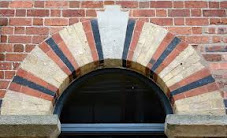The first reading for the feast of Saint Thomas the Apostle on July 3 was from the second chapter of Ephesians. Here Paul is addressing himself to Gentile Christians, that is, people who had been converted to Christianity not from Judaism, but from pagan religion. He is assuring them that the divisions between gentile and Jew that were in force under the Old Jewish Law no longer apply: all of us, he says, whether Gentile or Jew, are all one in Christ. We are no longer strangers or aliens to one another. Here is the passage:
Brothers and sisters:
but you are fellow citizens with the holy ones
and members of the household of God,
built upon the foundation of the Apostles and prophets,
with Christ Jesus himself as the capstone.
Through him the whole structure is held together
and grows into a temple sacred in the Lord;
in him you also are being built together
into a dwelling place of God in the Spirit (Eph 2:19-22).
The first time I read this in the original Greek I saw that the writer was playing with a Greek root, but the play on words disappears completely when the passage is translated. I would like to share with you a glimpse of Paul's clever play on the word, oikos, which means ¨house,¨ or in its common figurative meaning, ¨family.¨ For example, you remember that Saint Luke tells us that the virgin Mary ¨was espoused to a man named Joseph of the oikos of David.¨ The ¨house¨ here is the ¨family¨ or lineage of David
With this in mind, let´s go through the passage and lift out each word which involves the root oik- (house,family). I hope that you´ll share some of the satisfaction that I feel as I bring to light the treasures hidden in this passage.
Brothers and sisters:
You are no longer strangers and sojourners,
but you are fellow citizens with the holy ones
and members of the household of God, (okeioi)
[Another translation might be ¨you are members God´s family,¨ or even ¨you are relatives of God.¨ ¨Yes,¨ you might say to a friend, ¨I´m related to God.¨]
built upon (epoikodomethentes) the foundation of the Apostles and prophets.
[This rather long Greek word, a straightforward term used in house construction, lifts up the role of the apostles as the ones chosen by God to serve as the firm basis on which the Church will be built. ]
 |
| Christ the capstone of the Church |
with Christ Jesus himself as the capstone.
Through him the whole structure (oikodome) is held together
[The noun (oikodome) is the word for a ¨structure or a building.¨]
and grows into a temple sacred in the Lord;
in him you also are being built together (sunoikodoemsthei)
[The prefix sun - or syn- means ¨with.¨ So ¨built together ¨gives me the picture of all of us being intimately unified by belonging to the great project of ¨building" the Church of Christ.]
into a dwelling place of God in the Spirit.
The first time that the root oikos occurs in this passage, it is used in the figurative sense of household or family. The other four times it is used literally, borrowing imagery from architecture or construction.
Now you may want go back and read the passage as given at the beginning of this post and notice how that first word, okeioi ("members of God´s family") colors the rest of the passage, reminding you that you are a member of God´s vast family and loved by him as his very favorite family member.





No comments:
Post a Comment